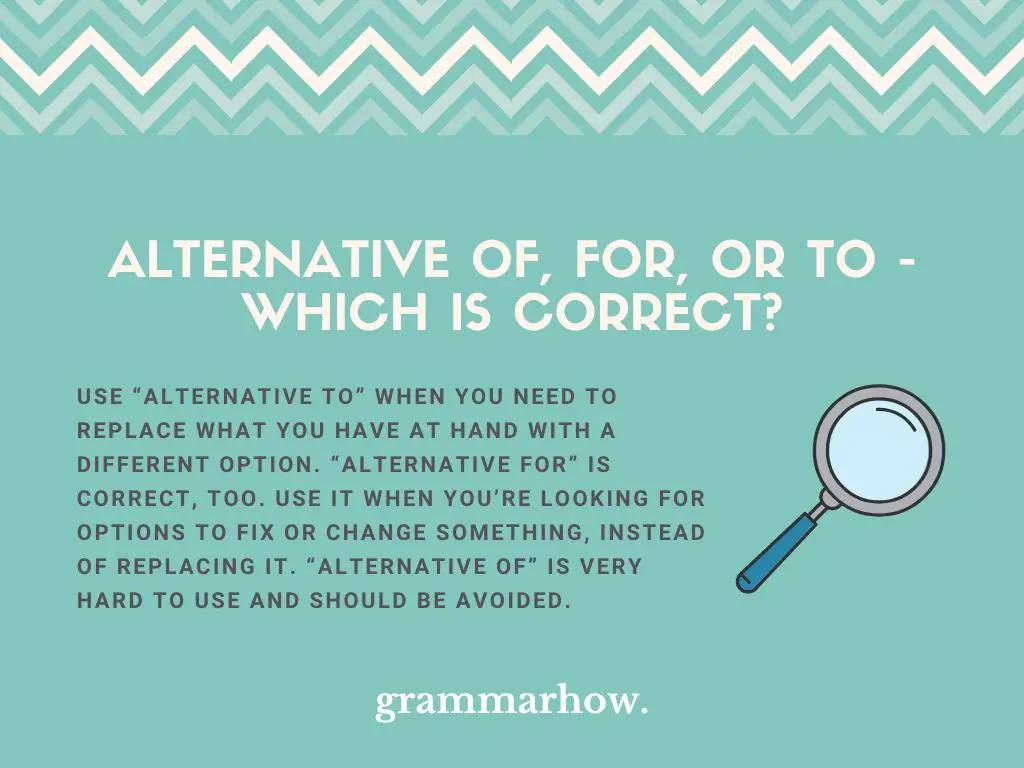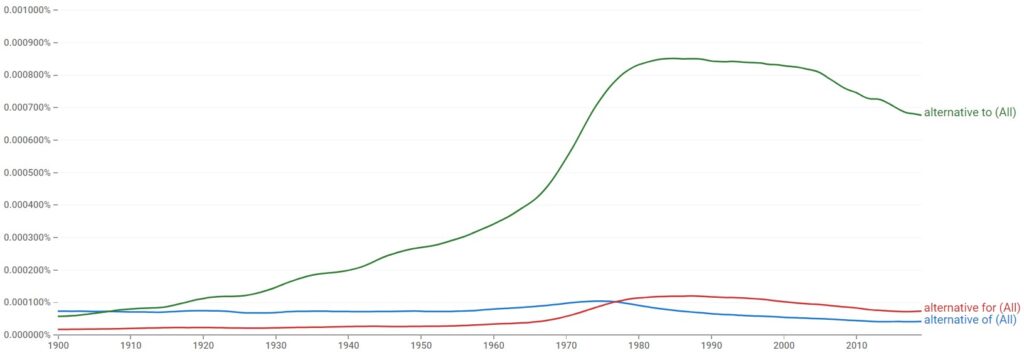What’s the correct form to talk about an alternative? Should we say “Alternative Of”, “Alternative For”, or “Alternative To”?
Let’s find out the correct and appropriate way to use each phrase in our daily communications.
Alternative Of, For, or To – Which Is Correct?
Use “Alternative To” when you need to replace what you have at hand with a different option. “Alternative For” is correct, too. Use it when you’re looking for options to fix or change something, instead of replacing it. “Alternative Of” is very hard to use and should be avoided.

Take a look at the examples below:
- What are the alternatives to this project?
- What are the alternatives for this project?
- What are the alternatives of this project? (incorrect)
Although the sentences in the examples are very similar, they have completely different meanings.
The first sentence asks about how to replace this project and what would be an “Alternative To” it. The second sentence asks about what we can do about the project, to change it, and what would be an “Alternative For” it.
The third sentence, which uses “ Alternative Of”, is incorrect and should be avoided.
Alternative Of
“Alternative Of” is grammatically correct, but it’s hard to use. It could work if used like “as the alternative of”. Also, it could work if “of” was related to the alternative, introducing an adjective to describe it.
Take a look at the examples below:
- The alternative of borrowing money worried us all.
- The team didn’t find an alternative of significance, that would justify persisting any further.
- What are some good alternatives of in-person classes? (incorrect)
- What are some good alternatives to in-person classes?
- Are there any alternatives of living on campus? (incorrect)
- Are there any alternatives for living on campus?
Sentences 1 and 2 show “Alternative Of” being correctly used. As you can see, those sentences are very formal. They may even sound very obsolete, different than how people currently communicate.
Sentences 3 and 4 show “Alternative Of” being incorrectly used, when “Alternative To” was the correct choice. While sentences 5 and 6 show “Alternative Of” incorrectly placed where “Alternative For” should be.
Our recommendation is to avoid using “Alternative Of”.
Alternative For
“Alternative For” indicates that the subject is looking for options for the situation described in the sentence. It doesn’t mean they want something instead or are looking for a replacement.
On the contrary, they’re trying to find out the best way to manage it, fix it or address it. Let’s go over some helpful examples:
- Diet options are a good alternative for those struggling to reduce the intake of sugar.
- Do we have any good alternatives for Joshua?
- I wish we had more alternatives for you, but this is the only treatment available.
- Don was looking for alternatives for his daily caffeine boost, and I suggested green tea.
- What is the alternative for saving this project? I’m not ready to let it go.
When you look for an “Alternative For”, the goal isn’t to replace the problem or item at hand but to find a solution for it. Take a look at sentence 3, for example.
The person isn’t looking for an “Alternative To” Treatment – which would mean not having a treatment whatsoever. They’re looking for an “Alternative For” the treatment, which means options as to how the treatment could be provided or handled.
Alternative To
“Alternative To” is the safest, most common form to talk about an alternative. Usually, it indicates that something would ideally be substituted, and we need to find an option to replace it.
Think about this as follows: you have something in front of you, but you wish to change it for something else. You don’t want to fix it or change it. You want to know what you have instead, as in a completely different choice.
Let’s take a look at some examples that might help clarify this idea:
- I don’t want to have pasta today. What’s the alternative to it?
- Are there any alternatives to this model, I could choose from?
- Is there an alternative to this project?
- I wish there were more alternatives to driving in this city.
- She was looking for an alternative to working 9 to 5.
- We decided to give Paul a chance, as an alternative to letting him go.
Take a look at sentence 3. It indicated that they have a project, but for some reason want an “Alternative To” it. They aren’t trying to change the project. They’re trying to leave that project on the side for another one. They want a new project, they could choose instead.
Sentence 4 shows the same idea. In it, the subject is looking for “Alternatives To” driving. It means they wish they didn’t have to drive, and could take a bus or a train, for example, instead.
Which Is Used the Most?
Which one of those forms is used more often, “Alternative To”, “Alternative For”, or “Alternative Of”? Let’s take a look at the graph from Google Ngram Viewer below and find out.

“Alternative To” is the most used form. It’s the simplest and easiest one, that we can make sense of in sentences more frequently.
“Alternative For” appears in second, but is very close to the bottom of the graph, while “Alternative Of” is rarely used (as it should).
Final Thoughts
“Alternative To” is the most common, simple form: use it whenever you want to replace your option for something else. “Alternative For” means you want to change or fix what you have, without replacing it. “Alternative Of” is rarely correct and you should avoid it.

Martin holds a Master’s degree in Finance and International Business. He has six years of experience in professional communication with clients, executives, and colleagues. Furthermore, he has teaching experience from Aarhus University. Martin has been featured as an expert in communication and teaching on Forbes and Shopify. Read more about Martin here.

